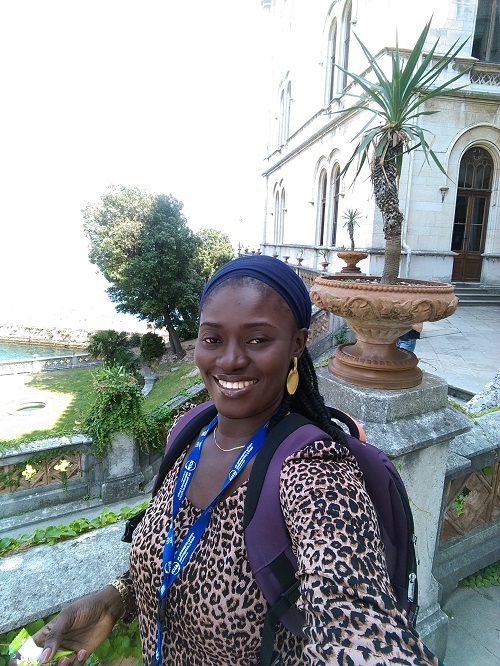10 out of 200: Bringing math to the people – Chinwendu Emilian Madubueze loves teaching
BLOG: Heidelberg Laureate Forum

Meet Chinwendu Emilian Madubueze, mathematician and one of this year’s 10 out of 200 young researchers participating in the 6th Heidelberg Laureate Forum from September 23-28, 2018.

What is your name and nationality?
Chinwendu Emilian Madubueze, I am Nigerian.
Where did you study and where are you currently based?
I studied Industrial Mathematics at the University of Benin, Nigeria. I did MSc, Mathematics at the same university. I just rounded up my PhD in Mathematics at the University of Agriculture, Makurdi, Nigeria and awaiting my certificate.
What is your current position?
I am a faculty member of my department at the University of Agriculture, Makurdi, Nigeria. I am looking forward to a postdoctoral position in mathematical epidemiology or biostatistics.
What is the focus of your research? What is your research project?
I am working on the mathematical modelling of infectious diseases such as Ebola virus disease (EVD). The EVD model incorporates some control measures such as contact tracing and quarantine in order to study their effects. The asymptotic stabilities, both local and global stabilities of the model are proved to exist. The sensitivity analysis approach is applied to the model to determine the model parameters that have the highest impact on the disease. This will help in developing a policy that will control the spread of EVD.
Why did you become a mathematician?
In elementary school, I realized in grade four that mathematics is my best subject. I used to read elementary six mathematics textbooks in class four. I was always the best in mathematics in my class, to the extent that most of the friends I had came to me for help. When I got admitted to the university, my family advised me against studying mathematics but I insisted it is either mathematics or nothing. I was made to promise to excel in mathematics as a precondition, which I achieved at the end.
I cannot think of studying anything that is not mathematics related. Coming across some many theorems named after some great mathematicians, I am working hard to have my theorem. Explaining mathematics to the understanding of fellow students had always been my pastime. I encourage most of my classmates to like mathematics especially women who think mathematics is meant only for men.
I always had this desire to teach Mathematics after my undergraduate days. Before one year compulsory service to my nation, I started teaching in secondary school. During another year of voluntary service, I had the opportunity to teach foundational mathematics to diploma and first year students. This prompted me to start a Master of Science in mathematics. I attended a conference by The Nigeria Association of Mathematical Physics during my M.Sc. which challenged me to specialize in Biomathematics because I learnt that mathematics can help eliminate infectious diseases. Biomathematics is a multidisciplinary field and I am always happy when I come across students studying Mathematics, the centre of all sciences.
What are some of the fundamental challenges you have faced in your academic career?
My earliest challenge has to do with my background. I had to hawk fruits to support my education and family. It was very difficult because I had no time to do home works. Furthermore, as a mother, family responsibilities such as pregnancy, nursing babies and raising children prevented me from attending many academic events. Thus, balancing career with family responsibilities has not been easy.
Additionally, gender bias such as the thinking that male counterparts are better in mathematics than female counterparts deprived one a lot of opportunities. There was also the problem of the lack of a female mentor in mathematics in my department.
What do you feel are the greatest pressures facing scientists today?
The greatest pressures facing scientist today include poor facilities, lack of funding and opportunities for self-development, especially in poor resource countries.
What are you doing besides research?
I love teaching and mentoring students in mathematics. I am fascinated by travelling, meeting people from diverse backgrounds, learning new things and observing nature in general. I love listening to good music, dancing, watching movies and cooking.
How did you hear about the HLF and why did you apply?
I heard it from a fellow colleague who attended the fifth HLF. I applied because I want to learn new things from renowned scholars.
What do you expect from this meeting?
I expect to meet researchers with similar interests with whom I can collaborate with in future. I am hoping to find a postdoctoral host in mathematical epidemiology, too.
Which laureates present at the forum would you really like to talk to and what do you want to ask them?
I would love to talk to laureates in my area of research.
Who were your most important mentors and what lessons did they pass on to you?
My most important mentors are Professor Emmanuel O. Oghre and Dr. Lami Nnamonu. Professor Emmanuel O. Oghre taught me the value of hard work and resilience while Dr. Lami Nnamonu helped me learn how to balance my career with family and the need to embark on self-development through attending conferences and workshops.
What is your ambition to teach others? Do you think being both, an excellent teacher and researcher at the same time is a goal conflict in the present system?
It had long been my childhood dream to teach people mathematics and I am already doing that. I strongly believe that being an excellent teacher and researcher at the same time is not a goal conflict in the present system. This is because both will complement each other for an effective learning experience. Furthermore, being an excellent teacher and researcher will make more impact on the mentee as a knowledge transfer would be. This is one of the differences between academics in rich countries and poor resource countries.


Keep shining girl. The top awaits you.
I am proud of you ma’am